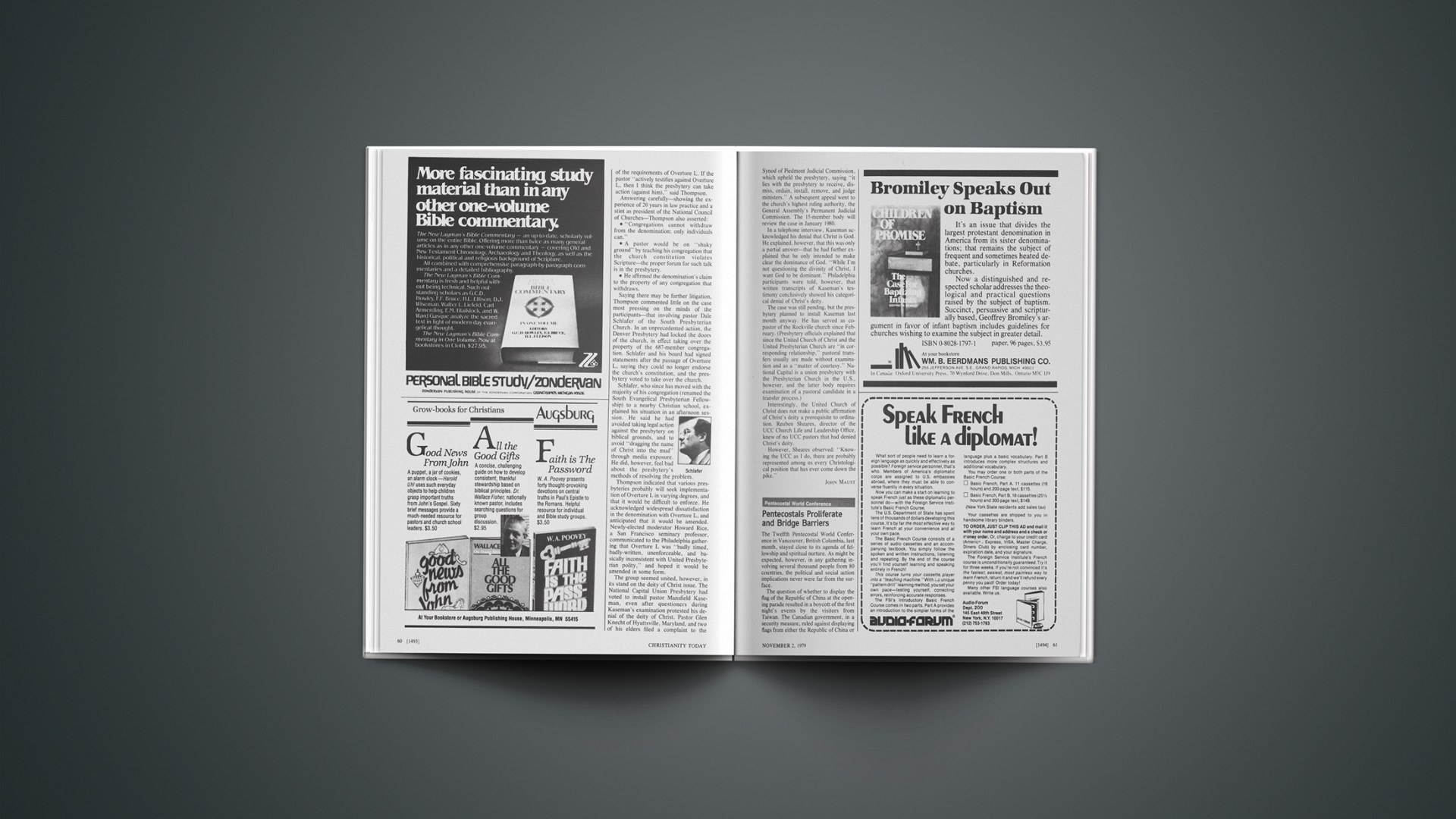Pentecostal World Conference
Pentecostals Proliferate and Bridge Barriers
The Twelfth Pentecostal World Conference in Vancouver, British Columbia, last month, stayed close to its agenda of fellowship and spiritual nurture. As might be expected, however, in any gathering involving several thousand people from 80 countries, the political and social action implications never were far from the surface.
The question of whether to display the flag of the Republic of China at the opening parade resulted in a boycott of the first night’s events by the visitors from Taiwan. The Canadian government, in a security measure, ruled against displaying flags from either the Republic of China or the People’s Republic of China. The ruling apparently was the result of an agreement between Canada and the People’s Republic to permit visitors from that country into Canada for the conference. While the ROC flag did not fly, verbal recognition was given the islanders and that was enough to help heal the rift before it became public knowledge.
Attempts to bridge barriers were seen on several levels, including:
• The inclusion for the first time of a neocharismatic, Episcopalian Dennis Bennett from Seattle, on the speaker’s roster.
• The presence of visitors from Eastern bloc countries and Cuba, who appeared capable of mingling with those from such ideologically opposite countries as Chile and South Korea.
• The carefully stated references, by conference advisory committee chairman Thomas Zimmerman of the United States, to the Pentecostal role in social action.
Zimmerman’s remarks came during his opening night address, when he stressed that Pentecostals, as a natural consequence of their message, have traditionally been on the cutting edge of social improvement. He pointed to the recent relief aid Pentecostals sent quickly to the Dominican Republic as an example of that emphasis.
In interviews, participants showed some variations in their expectation, as well as in their differing perceptions of Pentecostalism.
Reinhold Ulonska, general superintendent of the Pentecostal churches of West Germany, commented on the “excellent preaching and music,” but said he missed the “exercise of spiritual gifts”—such as healing.
Referring to his churches at home, Ulonska suggested there is a new sense of “evangelizing and pioneering” in West Germany, with healings “happening regularly in church services.” He noted that churches in the Eastern bloc appeared to be emerging from a “dried out” period brought on by lack of contact with Pentecostals in the West.
Among the Eastern bloc visitors was Miroslaw Fochtman, pastor of the 60-member United Evangelical Church of Oliwice, Poland. Fochtman spoke of a relative freedom for Pentecostals to reach out in Poland, through summer youth missionary teams and follow-up of radio broadcasts prepared in Warsaw but broadcast from Monte Carlo.
One Eastern bloc country that was unrepresented was the Soviet Union. At a premeeting press conference, several Pentecostal journalists quizzed Zimmerman about the absence of the Soviets, noting that five had been slated to attend. Questioners wondered if the recent defection of several Soviet performers had created an atmosphere inconducive to the Russian visit. Zimmerman maintained that previous heavy work schedules and a lack of budget prevented the Soviet conferees from coming.
An attitude of diplomacy, as personified by Zimmerman, prevailed in the advisory committee. Paul Yonggi Cho, pastor of the 100,000-member Full Gospel Central Church of Seoul, South Korea, spoke during an interview of his impatience to see stances taken against persecution of Christians in Communist countries.
He noted, however, that “brethren wiser than I” counsel against such outspokenness for the sake of potential victims of repression.
The presence of Dennis Bennett, who spoke at the conference and at sessions of the Society for Pentecostal Studies, was not the only evidence of rapport between denominational Pentecostals and neocharismatics in mainline churches. Also on hand was the archbishop of Bangalore, India, Paul Arokiaswamy, who took the opportunity to make new friends for charismatic Catholics.
Varying perceptions of church growth methods also were evident. John Thannickal, president of New Life Ashram of Bangalore, India, was cautious about the idea of introducing Seoul or Santiago, Chile, superchurch methods into the Indian cultural setting. He said that in his country there is a need to teach before asking people to accept Christ.
Thannickal currently is pioneering a discipling program in which he hopes to train 100 people by December 1980. These people in turn will teach sessions of 20 people each, with a potential to reach 10,000 persons a year, he said.
Thannickal believes India is on the verge of a Pentecostal revival. Yonggi Cho and Javier Vasquez, pastor of the 80,000-member Santiago Evangelical Cathedral, view their countries as being in the midst of continuing revival.
The situations in India on the one hand, and in Chile and Korea on the other, might not be as divergent as they seem. Vasquez spoke of leading weekly sessions with 1,200 Sunday school teachers, who carry the Pentecostal message to dozens of thousands more throughout the city. And Cho spoke of the cell unit system, which involves several thousand trained deacons in similar roles.
But visitors seemed to concede that Africa is the continent to watch. Samuel Odunaike, general supervisor of the Four Square Gospel Church in Nigeria, made reference to some demographic projections that see Africa as being highly Christianized by the end of the century.
That appeared to be the reason for slating the 1983 Pentecostal World Conference for Nairobi, Kenya. As advisory committee secretary Percy Brewster of Wales put it: “Africa is at the boiling point. It is now or never.”
LLOYD MACKEY










